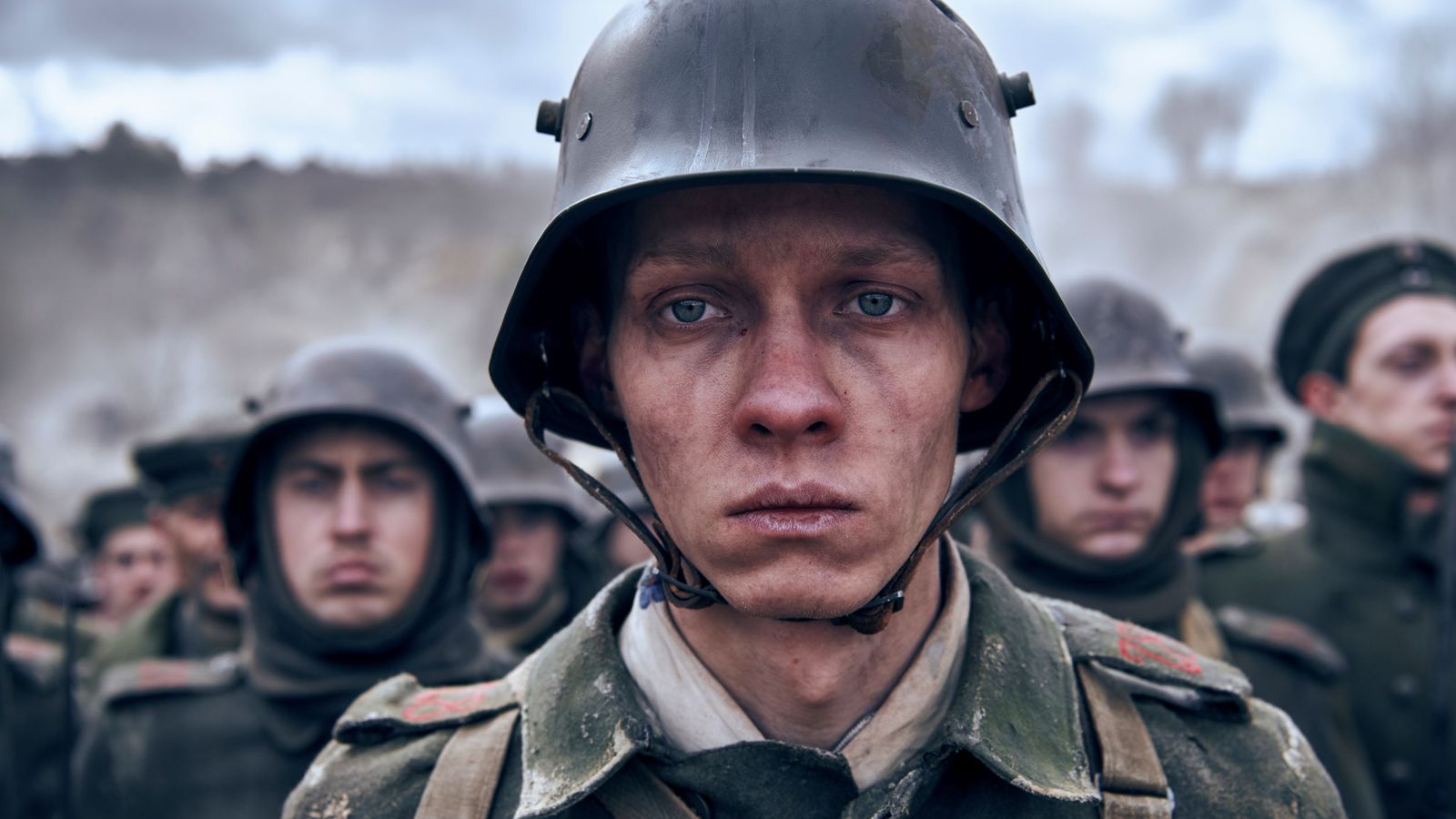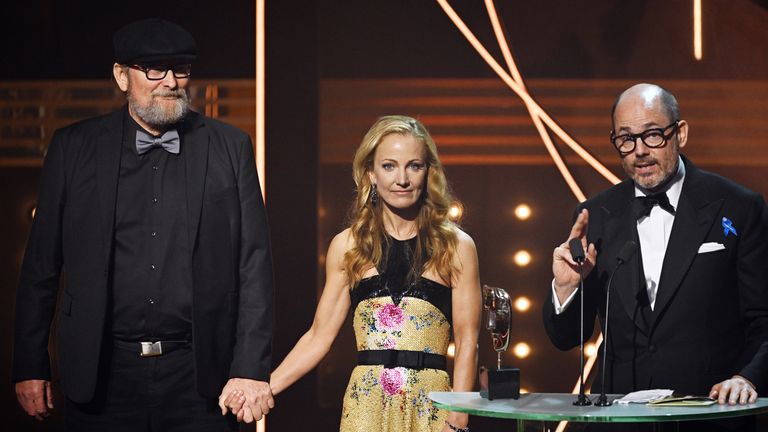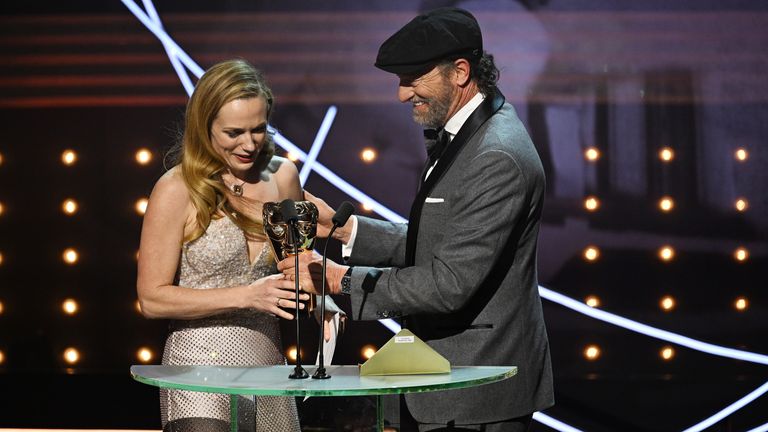All Quiet On The Western Front has made history, scoring the highest number of BAFTAs for a foreign language film with seven awards – including the night’s big prize for best film.
The Netflix anti-war epic movie had led the BAFTA nominations with 14, equalling the record set in 2001 by Crouching Tiger as a non-English language film with the most nods.
Edward Berger’s reworking of Erich Maria Remarque’s 1928 novel of the same name took the prizes for best director, film not in the English language, adapted screenplay, cinematography and original score and sound, as well as best film.
Its seven wins break the record for the highest number of BAFTAs won by a foreign language film – previously held by Italian coming-of-age drama Cinema Paradiso, which claimed five in 1988.
Director Berger told Sky News: “Best director is the one I never thought would work. It’s a German movie, for Christ’s sake!”
Speaking on stage while accepting the award for best picture, cinematographer James Friend said the film showed how a generation of young German men were “poisoned by right-wing nationalistic propaganda” and he stressed that the film’s message remains relevant nearly a century on.
Berger also paid tribute to those currently fighting in Ukraine, his comments adding to a political flavour on the night, with many stars including Cate Blanchett, Colin Farrell and Michelle Yeoh all wearing a blue ribbon to show their solidarity and support for refugees and displaced people around the world.
Martin McDonagh’s Irish tragi-comedy The Banshees Of Inisherin – which tells a tale of male friendship gone sour – took four gongs, as did Baz Luhrmann’s whirlwind biopic Elvis, about the king of rock and roll.
Austin Butler, 31, was named best actor for his portrayal of Elvis, who died prematurely aged 42 in 1977. The emotional star paid tribute to the Presley family as he accepted his award, saying: “I cannot thank you enough for your love… this means the world to me.”
Elvis’s only daughter, Lisa Marie Presley, died last month aged just 54.
Many had expected Banshees star Farrell to take the best actor prize, so this win was one of the surprises of the night.
Blanchett picked up the best actress award, calling the role of monstrous maestro Lydia Tar, “dangerous and potentially career-ending”.
Becoming emotional towards the end of her speech, she paid tribute to her family – listing her mother and four children – who she said had to put up with her absence for long periods of time while she was working on the movie.
The Banshees of Inisherin saw a double win in the supporting actor and actress categories, with Kerry Condon and Barry Keoghan taking the prizes.
Condon’s win followed a brief mix-up, when a miscommunication between a sign language translator and deaf Oscar-winning actor Troy Kotsur, who was presenting the award, saw Carey Mulligan initially announced as the winner.
Read more:
As it happened: BAFTA Awards 2023 live
How to watch all the BAFTA nominated films
With the translator quickly correcting himself, the ceremony soon got back on track, with Condon thanking the cast – as well as her horses and dogs – for the win.
Multiverse sci-fi Everything Everywhere All At Once, indie hit Aftersun, James Cameron blockbuster Avatar: The Way of Water and 1920s Hollywood love-letter Babylon all took once gong each.
For the first time, this year’s awards were held at the Queen Elizabeth Hall on the Southbank in London.
The night was hosted by actor Richard E Grant, who led the show from the auditorium, and This Morning presenter Alison Hammond who spoke to the stars in a new BAFTA studio, giving viewers at home an access-all-areas experience of one of the biggest nights in film.
For the first time in BAFTA history, four of the night’s 25 categories were broadcast live – meaning those in the auditorium got to hear the biggest winners at the same time as the viewing public, most likely prompted by the show’s bosses striving to stay relevant in a landscape of ever-declining award show audiences.
There were also live music performances from US actress Ariana DeBose, London-born rapper Little Simz and musician Dylan.
The Prince and Princess of Wales were among those in attendance, and Oscar-winning actress Helen Mirren led a tribute to the late Queen.
While four-time BAFTA winner Blanchett called 2022 an “extraordinary year for women” in her best actress acceptance speech, just one woman – Gina Prince-Bythewood, who directed The Woman King – made the best director category, and she missed out on the prize – which went to Berger for All Quiet On The Western Front.
While men dominated the BAFTA film shortlist, and no female-directed films made it into the best film category, the outstanding debut by a British writer, director or producer category was an all-female shortlist of talent; the writer and director of Aftersun, Charlotte Wells, took that award.
Ahead of the ceremony, when asked about the possibility of gender-neutral performance categories – as the Brits has adopted – BAFTA chief executive Jane Millichip said there was “no timeline” for making a decision as they want to get it right, and they are currently consulting with organisations such as GLAAD (Gay and Lesbian Alliance Against Defamation).




